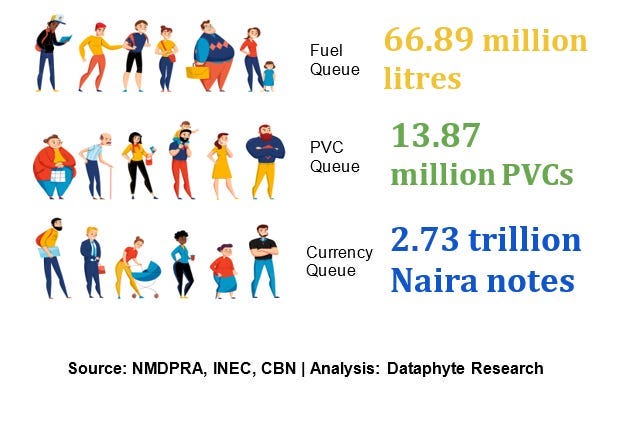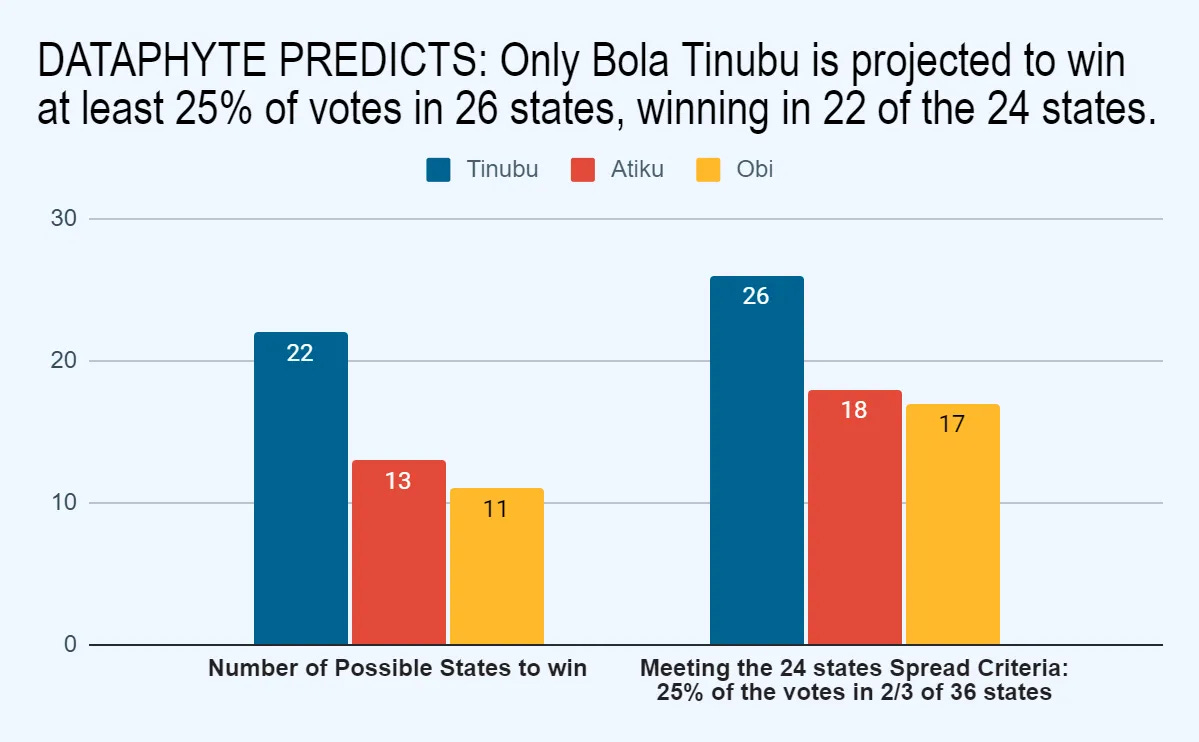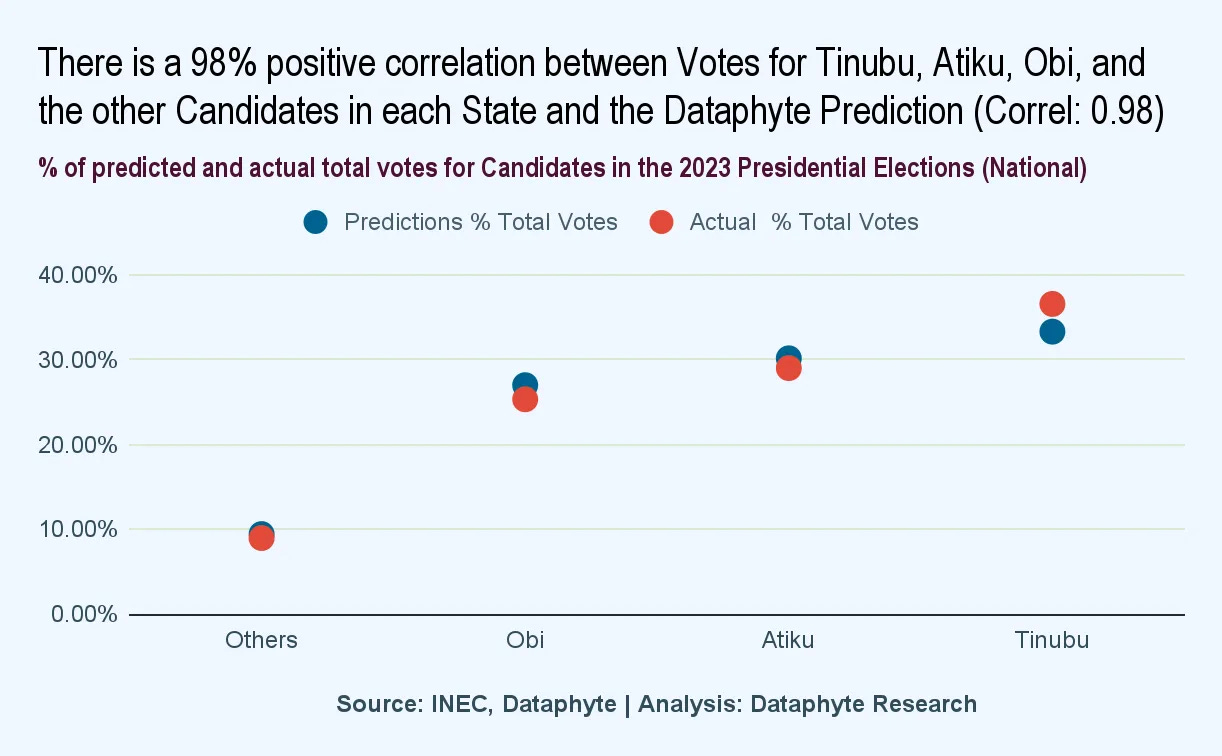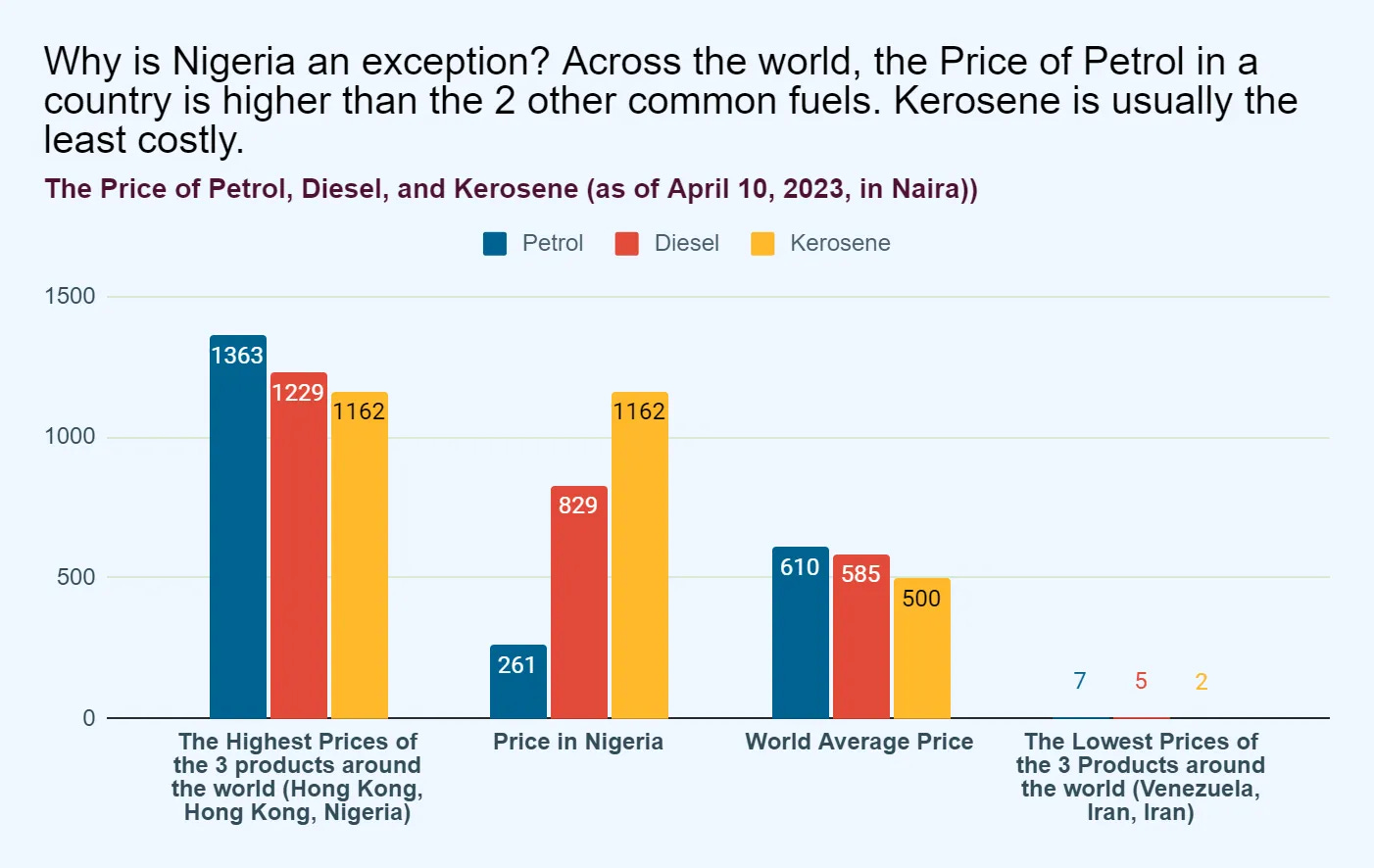Remembering 2023, Month by Month
What a blessing to witness the end of such a terrifying, sorry, terrific year.
So good to be writing with the feeling there’s one lady and gentleman out there reading their 54th edition of Dataphyte’s weekly Data Dive this year.
Hmm. Not exactly.
For those reading this in the Diaspora, it may be the first edition of the New Year.
If you’re reading this at home in Nigeria by 1.00 pm December 31, 2023, another reader in New Zealand is already in the New Year 2024.
Anyway, for readers at home in Nigeria, let’s make-believe we’re all still in 2023 now.
We opened up to you at the beginning of the year that “Through the carefully crafted narrative, the variegated chart, and our varied art forms, we desire that, together, we can make sense of mined facts for informed perspectives and measured decisions throughout the year 2023.”
Why Data Dives?
“We know hundreds of news break within a week and different follow-up opinions are written. Yet, the Data that should Define your next, informed Decisions are rarely spotted. So we Dive into the Social, Political and Economic Data from the daily events and reports and pull out the trends and tides to Drive your next smart move.”
That’s why we set out early to set you up for “deep dives into the obvious and the veiled politico-economic issues of the year.” Do you think we succeeded at that?
Today, we’ll attempt to recap the best read Data Dives month by month. We feature 2 for each month - the most read and the next most read.
Here's to reminiscences of the 12 months gone by.
January
Of the 5 Data Dives published in January, the second most read is 22 Alphameric Data Points that Defined Nigeria in 2022 (Part 2). Coincidentally, this was the second edition of a like recap of issues in the outgone year.
The most read is 3 Costly Queues this Weekend: Old Queues, New Queuers, and the Naira Queries. Here’s the introduction:
“The average Nigerian will find herself/himself in one or more of three queues this weekend.
This January, the first month of the last year of Muhammadu Buhari’s presidency, the people find themselves in 3 separate but simultaneous existential queues.
The old queue, the perennial one, is the long wait for people to buy petrol in filling stations.
There are anti-queue quickies, though, at the end of every mile - guys who offer fuel in jerricans without delay for those who can pay between N350 and N450 per litre.
The new queue, the present one, is the lost hours of viable women and men who want to receive their Permanent Voters Card (PVC) for the February 25, 2023 general elections. The deadline for collection is tomorrow, January 29, 2023.
There’s great enthusiasm to vote this time, especially among the young and middle-aged, who together represent over 92% of the 9.5 million newly registered voters.
The Naira queue, the perplexing one, is the one forced on people who are neither ready to queue for fuel nor ready to queue for PVCs. They are forced to deposit all the 3 highest denominations of the old currencies in their possession in the bank in 2 days' time, January 30, 2023.
According to the Central Bank of Nigeria (CBN), the N200, N500, and N1000 notes cease to be legal tender by January 31, 2023.
This measure is the high point of the CBN’s demonetisation policy in the bid to retrieve cash stored out of bank vaults towards achieving the cashless economy policy. But there are complaints about the little time (3 months) given and the scarcity of the new notes, among other concerns.
There are several reports that those ready to deposit the old currencies do not have the new notes to spend. Thus, there are 2 sub-queues here: the queue to get new notes to spend and the queue to deposit the old notes.”
February
Of the 4 Data Dives published in February, the second most read edition was President Atiku: Muslim Grade, Middle Ground. Remember, this was the election month.
The most read in February is President Tinubu: Predilections and Predictions. It’s also the most-read Data Dive in the year 2023. Here’s the Introduction:
“The heat is on!
D-day is 14 days away!
Who will win the presidential race the coming Saturday?
I don’t have a guess. So we went ground-truthing stats, state by state. We found the current scenario to be similar to that in the 2015 elections. We obtained and analysed past voting patterns, voter turnouts, voter choice homogeneity, the religious homogeneity index, and so on.
In short, by deploying reliable statistical estimators, we measured the people’s voting predilections and came to the conclusion that Tinubu would win the popular votes and would be the only candidate to satisfy the spread criteria of a minimum of 25% votes in ⅔ of the 36 states (We’ll discuss the methodology in detail later).
This prediction cancels out the oft-speculated possibility of having ties at the first instance of the election on February 25, which would then occasion a rerun to determine the winner.
The race is so close and uncertain that people are beginning to wonder, “Would there be a clear winner come February 25, 2023, or would there be a rerun?”
The reason is that Nigeria’s political landscape underwent a seismic shift for good with the emergence of Peter Obi of the Labour Party (LP) in the race.”
March
Of the 5 Data Dives published in March, the second most read edition is On Legitimacy and Legacy: Tinubu’s Head and Troubles Ahead. Of course, this came at a time when many were not sure the President-Elect would be sworn in.
However, the most read edition in March is President-elect Tinubu: Glimpses, Glitches, and Glints (Initial Glimpses, INEC’s Glitches, and Individual Glints). Here’s the Introduction:
““Historical data of sentiments and behavioural pattern is closest for predictions!”
This was the conclusion of Joshua Olufemi, Founder and Executive Director of Dataphyte in his response to Dataphyte’s precision prediction of the outcome of the 2023 Presidential polls, after INEC announced the final results on Wednesday morning.
At the dawn of the first day of March 2023, Bola Ahmed Tinubu, the All Progressives Congress (APC) candidate, emerged as the winner of the February 25, 2023, presidential elections to become Nigeria’s President-elect.
Dataphyte was the first to give a detailed prediction of a clear win for Bola Ahmed Tinubu of the All Progressives Congress (APC) at the first round of elections, without a tie and a need for a run-off election.
“This prediction cancels out the oft-speculated possibility of having ties at the first instance of the election on February 25, which would then occasion a rerun [sic] to determine the winner”, Dataphyte rightly predicted.
There is a 98% positive correlation between the actual reported votes for Tinubu, Atiku, Obi, and the other candidates in each State and the Dataphyte Prediction.
This means Dataphyte’s prediction of the Presidential elections matches the order of the final outcome by 98%.”
April
By April, the hot topics began to move slowly away from partisan politics to policy issues.
So, it was not surprising that, of the 5 published Dives in April, the second most read is To Fuel or Not to Fuel Subsidy: The $800 million question.
This time, the second part of March’s first runner-up, On Legitimacy and Legacy: Tinubu’s head and Troubles ahead (2) took the first spot as the most read newsletter in April. Here’s the Introduction:
“There is something off about the price of petrol in Nigeria!
Can you spot it? 🔬
If we can spot it, it could help us decide whether the government should continue to subsidise the current pump price or instead impose taxes on petrol consumption.
This is it: All over the world, the price of petrol, diesel and kerosene are relatively close. Petrol has the highest price, followed by diesel and kerosene. In short, petrol is the costliest and kerosene is the cheapest.
In Nigeria, the opposite is the case.
In Nigeria, the 3 fuel products have the highest price range. That is, the difference between the price of the cheapest product (petrol) and the costliest product (kerosene) is N901.
This is according to Dataphyte Research’s analysis of world petroleum product prices as of April 10, 2023.
However, the difference between the highest prices of these 3 petroleum products around the world is N201.
Also, the difference between the average prices for the 3 petroleum products around the world is N110.
Lastly, the price difference between the lowest prices of the 3 products around the world is N5.
Besides the sharp differences between the high range of prices of fuel products in Nigeria and the moderate and low ranges around the world, petroleum product prices also exhibit an awkward pattern in Nigeria.
In Nigeria, petrol is cheap, diesel is costly, and kerosene costliest. This is opposite to the global trend where petrol is the costliest, diesel is cheap, and kerosene is the cheapest.
Due to subsidy, the petrol price is still officially fixed at N185 but purchased at an average of N261 nationwide. For over two decades, the government has argued that it cannot sustain this relatively low petrol price with the huge public spending.”
May
May was Buhari’s month - of entry and exit 8 years after. While few will disagree that Buhari had a glorious entry in 2015, few will disagree that the old soldier’s exit from governance in May 2023 was an inglorious one. Any way we moderated all of these in 3 consecutive editions. The second edition, which centred on Buhari’s Bad was the second most read: A Glorious Exit: The Good, the Bad, and the Buharian (2)
The first edition, A Glorious Exit: The Good, the Bad, and the Buharian, which centred on Buhari’s Good, was the most read for the month. Here’s the Introduction:
“The law gives Muhammadu Buhari till 12 noon May 29, 2023 to vacate Nigeria’s highest office for the second time as the number one citizen of Nigeria.
But this exit is one with a difference. For the man, it is a glorious one!
“I got what I wanted and will quietly retire to my home town,” he said.
“I consider myself lucky to have been a governor, minister, head of state and now President for two terms,” he added.
“I think it is a good coincidence for me to say goodbye to you, and thank you for tolerating me for almost eight years,” he concluded.
This time he is not forced out of Dodan Barracks, Lagos. Instead, he is the one who now longs to leave Aso Rock, Abuja.
“I am eager to go. I can tell you it has been tough,” he said last July.
Again, we all must praise either the conflicted deities of the fatherland or the cooperative doctors in a foreign land for this glorious exit of Buhari. One of these revived our president when he was very ill.
Thus, General President Muhammadu Buhari (GPMB) not only survived disgrace from an un-found certificate, dethronement by an unsuccessful coup, sorry, impeachment, but he also escaped death from undisclosed cancer.
And finally, he has overcome the rats that resisted his entry into his office and the rumours that his doppelganger, Jubril of Sudan, had acted for him at some time during his presidency.
Now that everyone is sure that it is Buhari of Nigeria that will exit the office of the President this May, let’s see the markers of his 8-year tenure - the good, the bad, and the Buharian markers.
Wait! What are Buharian markers?
A moment. We’ll surely get to that.”
June
With Buhari out and Tinubu in, the emphasis shifted towards Tinubu’s handling of the country’s multifaceted issues. Little wonder Tinubu’s Trinities: Policies, Politics, and Policing was the second most read Data Dive in June.
While the government changed, corruption remained. This chief concern of the citizenry shot Scammers Paradise: Nigeria’s Air, Water and Land to the most read Data Dive in June. Here’s the introduction:
“Welcome to Scammers Paradise!
No contradictions.
Nigeria is a place of ongoing tragedy and unceasing comedy, outgoing subsidy and uncertain remedy.
That resignation brings hope, that realisation brings happiness, with everything that Coolio found in Gangsta’s Paradise till he was 59. Everything in Pastime Paradise that Steve Wonder lives in, 73 years on.
Two Saturdays into President Tinubu’s accession as the 16th ruler in these parts of Paradise, some dualistic scenarios began to play out - typical of those opposites in Milton’s Paradise lost.
One, as soon as President Tinubu announced an end to the petrol subsidy scam last week, labour leaders on the other side announced the beginning of strike action, protesting financial pangs visited by the soaring cost of transport and living.
Conversely, as soon as the labour unions suspended their intended strike action, deciding to keep working under the new austere conditions, the Presidency, on the other side, suspended the Governor of the Central Bank, Godwin Emefiele, from further work at his office.
“This (suspension) is sequel to the ongoing investigation of his office and the planned reforms in the financial sector of the economy,” the Secretary to the Government of the Federation’s spokesman, Willie Bassey, said.
One hopes they remove the subsidy and audit what is gone just as they’re removing Emefiele and auditing what he’s done.
Again, just as news of President Tinubu’s first appointees spread in town, news spread too of his predecessor’s appointees’ misspent time in office.
One of the latter is the Minister of Aviation, Hadi Sirika’s, role in the Nigeria Air scam. A scam that gulped 85 billion Naira and solicited free international embarrassment for the country.
Like Sirika’s Aviation Ministry, the Justice Ministry under Abubakar Malami is in the news too for providing refuge and refusing extradition requests for Nitin and Chetan Sandesara, two Indian fugitives wanted by the Indian authorities. The duo were accused of scamming several Indian state-owned banks of undeserved and unpaid debts to the tune of $1.7 billion.
Wanted criminals in their homeland, the Indian scammers have found a new land and a thriving oil exploration business in Nigeria.
For a fact, the Sandesaras are easily absorbed into these parts of paradise on account of their leading investment in Nigeria’s oil industry.
an industry plagued by piracy and oil theft from Nigeria’s littoral waters deep into the Gulf of Guinea
a bloody-greedy industry Nigerian naval officers have a conflicted relationship with, being seen as the main enemy to the offshore pirates but the minor enemy to the oil thieves.
On air, land and sea, Nigeria comes by as a safe haven for scammers.”
Thanks for reading this last Data Dive in 2023. Hope we featured one of your favourite editions. Never mind if your favourite Dive wasn’t reviewed, it could show up in the concluding part of the 2023 recap. See you in the New Year!







